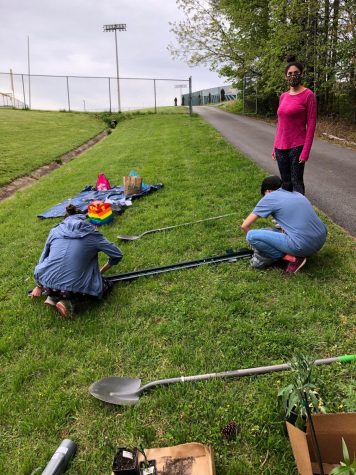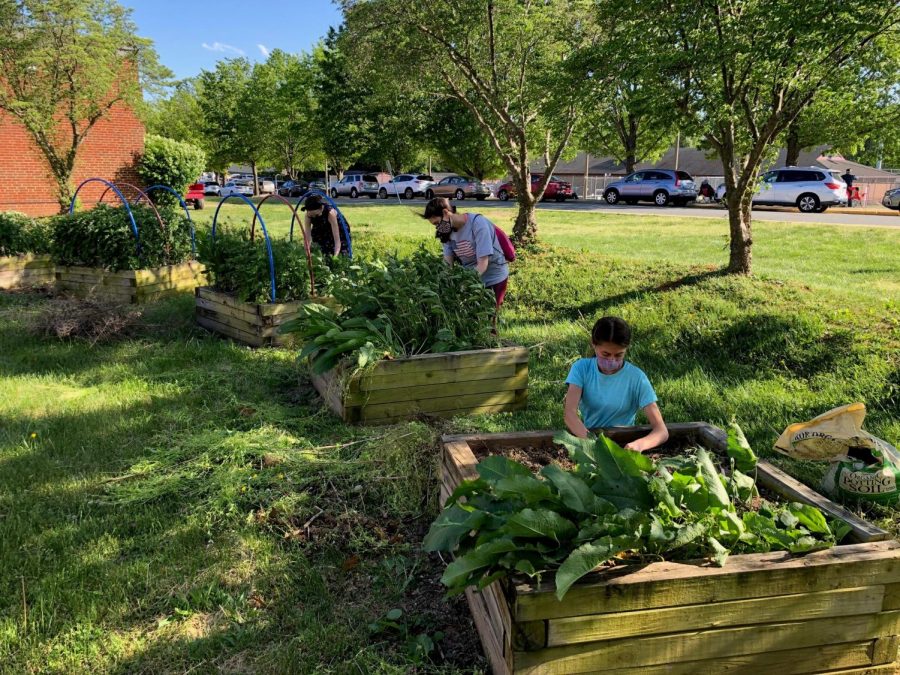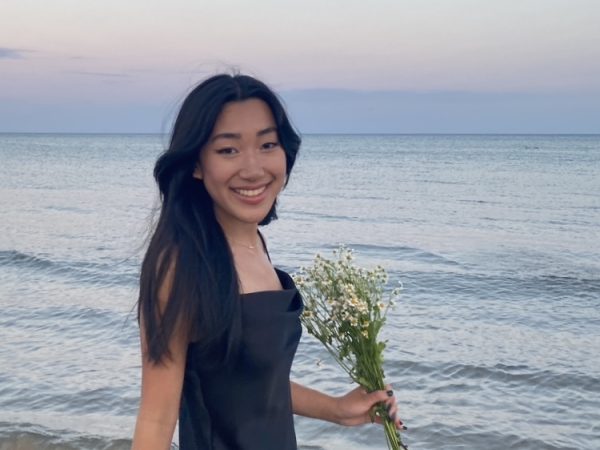Preserving Pollinators
Working on the raised beds across from the tennis courts, members of the Pollinators Club, juniors Jenna Coleman and Madeline Paczkowski, along with senior Luciana Chandross tend native plants last spring.
December 9, 2021
“[We’re] slowly making changes to how people view nature as not just something that is kind of extra but as something important,” Pollinators Club vice president junior Jenna Coleman said.
As of 2021, the native Virginian Rusty-patched bumble bee is federally recognized as an endangered species, while other pollinators are experiencing major population declines. To counter this ecological threat, the Pollinators Club is maintaining a garden to attract native pollinators.
Located behind the baseball field, the club started working on the garden two years ago. Despite the pandemic, the club continued to improve their garden, also expanding to raised beds across from the tennis courts.
“[The purpose of] the Pollinator Habitat Garden is mostly to raise awareness about the lack of native plants… we’re reintroducing native plants to help attract and maintain the levels of native bees and birds,” Coleman said.
The club has planted a large variety of native plants, such as redbud, mountain mint, and serviceberry, in order to appeal to a diverse array of pollinators.
“We want the plants that will attract the most [native] pollinators,” club president junior Madeline Paczowski said.
The garden is also aimed at attracting other wildlife and even people; students and teachers will be able to take walks to visit the garden and experience the nature there. “We hope to have put in some pathways so students can walk around, so it will really be for the whole community,” Paczowski said.
The group also wants to install a sustainable watering facility to replace their water tank. Paczowski said, “It has to be refilled by the staff from the county, so we would like to have a rain barrel.” This would allow the club to use collected rainwater to water plants rather than have the tank be refilled via a tractor.

To fund these efforts, the Pollinators Club uses grant money and plans to apply for more grants in the future. Last year, the club received a $5,000 grant from the Shannon Foundation, which they invested in bat boxes, a Lewis Ginter Botanical Garden webinar on native plants, and plants; some money has also been set aside for their future plans, like signage for the garden that would identify each type of plant.
It is especially urgent to the Pollinators Club to protect pollinator populations now. At the near-bottom of the food chain, they are essential to plant reproduction in the ecosystem, which affects the entire food chain.
“Pollinators are not only necessary to human survival, but also that of all other life,”Paczowski said.
“There are so many invasive plants and animals that are really destroying the native ecosystem. It needs the support of people to maintain it,” Coleman said. “Our world is becoming more built up and we have to be aware that we have to leave the environment for the other creatures.”
The club is open to anyone with an interest in gardening and the environment, or anyone who wants to spend time outside in nature.
“I’ve always really liked gardening and little creatures. I saw it [Pollinators Club] last year for Zoom when we were doing the school club fair and it just really struck my fancy; I’ve always liked that kind of stuff,” Coleman said.
“I wanted to do something during lunch and it seemed up my alley of interest, which was already environmental science,” Paczowski said. “It’s also a really fun thing to do with your spare time and a nice way to get outside and enjoy yourself during the school day when we’re all trapped inside.”
Non-club members can come to club meetings to learn about their efforts, pitch in with the garden, or even help code their website. Even those that are uninterested in nature can contribute to the club’s efforts.
“It doesn’t matter if you enjoy gardening or if you don’t like being outside; I know in the colder months a lot of people aren’t a fan,” Paczowski said. “You can help out in many ways that don’t involve getting your hands in the soil.”
If interested in the Pollinators Club, contact club sponsor Erin Wise-Ackenbom or club president Madeline Paczkowski.


